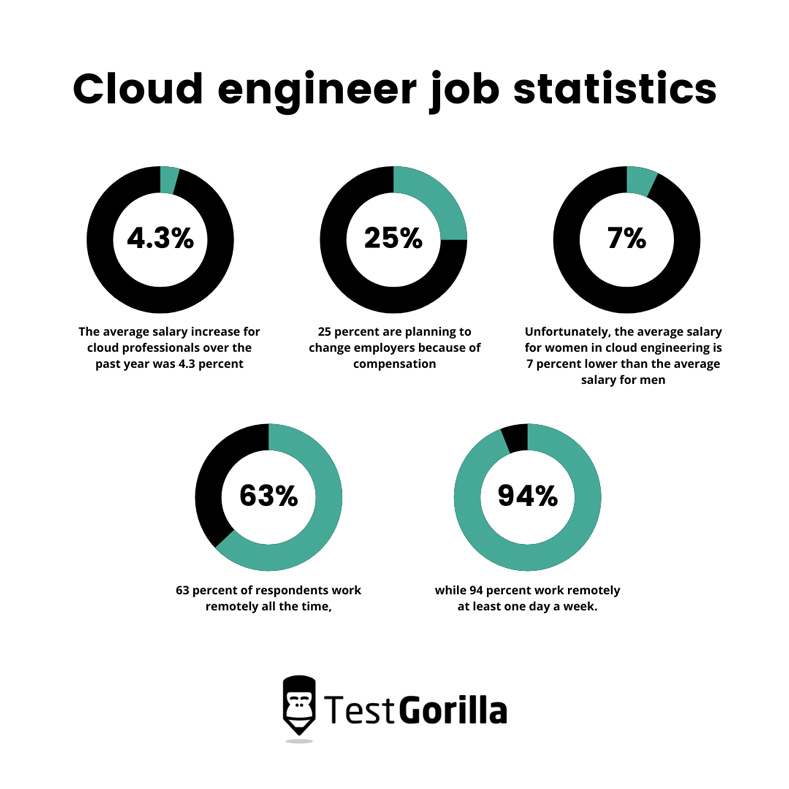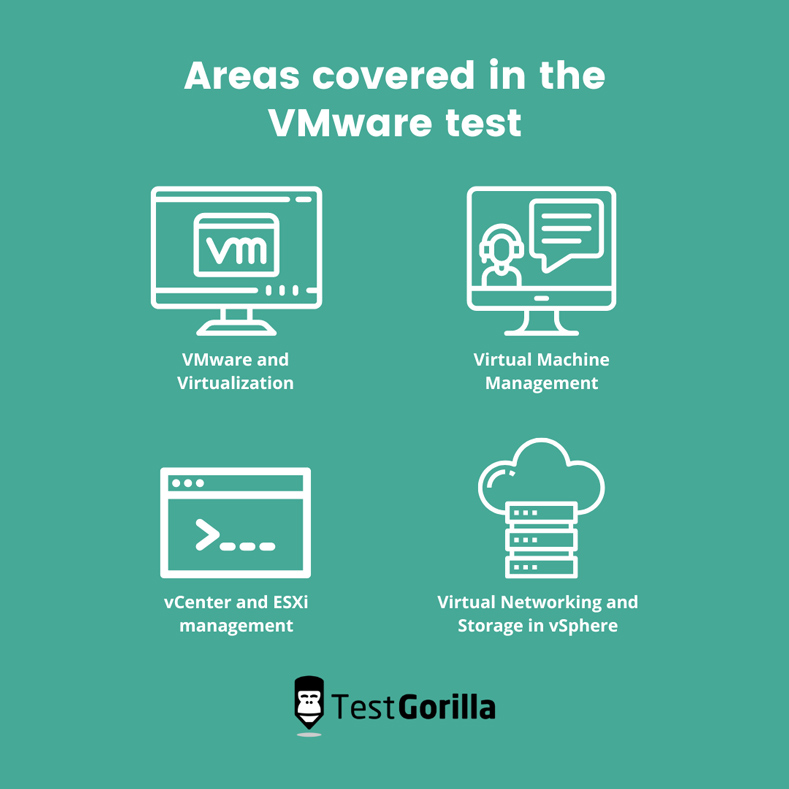Cloud engineer job description complete guide: Hire the best candidates without bias
It can be hard to find and hire quality cloud engineers, especially if you don’t have in-depth knowledge of the role yourself.
That’s why we’ve come up with a guide to writing a cloud engineer job description to help you find out all you need to know, including:
Cloud engineer roles and responsibilities
Cloud engineer salary
Essential skills for cloud engineers
How to use TestGorilla’s VMware test to your advantage
Let’s get started!
Table of contents
- Cloud engineer job overview
- Cloud engineer job description introduction
- Cloud engineer roles
- Cloud engineer job description: Cloud engineer salary
- Cloud engineer skills and qualifications
- Use our VMware test as part of a skills assessment
- Sign up for free with TestGorilla and find the best cloud engineers
Cloud engineer job overview
Cloud engineers design, implement, and oversee cloud-based systems for business. They perform all the technical duties involved in cloud computing, and although smaller businesses tend to employ one cloud engineer to do everything, larger organizations often have several cloud engineers who specialize in specific areas.
Good cloud engineers have experience with at least one of the three most popular cloud providers, which are Amazon Web Services (AWS), Google Cloud Platform, and Microsoft Azure.
For related info on AWS developers, check out this AWS developer job description.
Cloud engineer job description introduction
To start your cloud engineer job description, you should introduce your organization, and briefly but clearly describe your company values and culture.
If you’ve never written a cloud engineer job description before, it’s good to tell the reader how your cloud engineer is expected to contribute right from the start, and how their efforts will have an impact on your organization’s overall success.
Your cloud engineer job description should ideally have the list of responsibilities and preferred qualifications in bullet format where possible to make them easier to read. Make sure each point is clear and reflects the expectations of the role accurately.
The best insights on HR and recruitment, delivered to your inbox.
Biweekly updates. No spam. Unsubscribe any time.
Cloud engineer roles
The term “cloud engineer” tends to be an umbrella term that covers a number of different cloud computing jobs, so cloud engineer responsibilities differ widely. Before you write your cloud engineer job description, you’ll need to know what kind of cloud engineer you need. We’ll take a closer look at the most common cloud computing roles in this section.
Cloud Architecture
In a cloud environment, there are many computing, networking, and security services that require proper configuration, which you should include in your cloud engineer job description for cloud architecture. Those involved in cloud architecture work on assembling the cloud infrastructure and ensure that the correct users have access to the services they need to do their job.
Cloud contracts can be tricky to navigate, so cloud architects must also be aware of the fine print involved in cloud contracts so that the company doesn’t end up with unexpected charges.
Here are some of a cloud architect’s responsibilities:
Designing and deploying dynamically scalable and reliable applications on the cloud
Selecting the right cloud services to design and deploy an application based on given requirements
Migrating multi-tier applications on cloud platforms
Keeping costs to a minimum using cost-control strategies
Cloud Development
Cloud developers are responsible for analyzing customer requirements, coding, developing, and debugging of applications. The work they do is very similar to that of a software engineer, but with one big difference – the programs cloud developers create run on virtual systems.
You may want to include these skills in a cloud engineer job description for cloud development:
Expertise in at least one high-level programming language
Skills in developing, deploying, and debugging cloud applications
Skills in API usage, command line interface, and SDKs for writing applications
Knowledge of the key features of cloud service providers
Understanding of application lifecycle management
Ability to use continuous integration and distribution pipelines to deploy applications
Coding ability to implement essential security measures
Skills in writing, correcting, and debugging code modules
Code writing skills for serverless applications
Understanding the use of containers in development processes
Learn more: How to write a cloud developer job description
Cloud Operations Engineering
Cloud operations engineers are responsible for maintaining cloud-based systems. They work with different technologies, including servers, storage, networking equipment, and other hardware components.
They must make sure that everything is working together as it should in order to provide reliable service. Cloud operations engineers monitor performance and identify any issues, which they resolve as quickly as possible.
They’re tasked with ensuring that all of these pieces are working together properly to provide reliable service to customers. This often involves monitoring performance metrics, identifying issues as they arise, and resolving them as quickly as possible.
Cloud operations engineers have a range of responsibilities, which you may want to include in your cloud engineer job description:
Developing automation solutions to help streamline processes
Implementing security measures to protect data from unauthorized access or use
Monitoring the performance of cloud computing systems in real-time to ensure efficient and reliable performance
Designing and implementing disaster recovery solutions for data centers in order to reduce risks
Creating detailed documentation of all technical aspects of a cloud computing system such as configuration settings and troubleshooting procedures
Maintaining the security of an organization’s systems by monitoring activity logs and detecting signs of intrusions or malware infections
Performing capacity planning to determine whether resources will have enough space to handle growth in demand
Monitoring the health of applications by analyzing system logs for errors and performance problems
Recommending changes to application architecture or design to improve efficiency and performance
Cloud engineer job description: Cloud engineer salary
The pay range for a cloud engineer varies according to factors such as seniority, experience, and geographic location, and you’ll need to include the salary your organization is offering in your cloud engineer job description.
The average yearly salary for a cloud engineer in the US is $129,692
Overall, salaries fall between the range of $119,544 and $140,411 per year
The highest-paying US cities for cloud engineers to work in are:
San Jose: $145,079
New York: $132,082
San Diego: $128,709
Washington, DC: $125,754
Seattle: $122,280
There are a few companies that are willing to pay their cloud engineers way above the average salary, and the top spot is currently held by Stanford Healthcare, which pays its cloud engineers around $229,000 per year.
Cloud engineer skills and qualifications
Your cloud engineer job description wouldn’t be complete without a list of essential skills and qualifications:
Technical skills
Cloud engineers in all roles should be proficient in these areas:
Linux
Cloud engineers should have a strong understanding of the Linux operating system, which is often used for cloud development. Cloud engineers should understand the architecture, maintenance, and administration of Linux servers.
Databases
Cloud engineers should be competent in managing cloud databases and have knowledge of MySQL and Hadoop.
Programming
It’s essential that cloud developers have strong general programming skills, along with knowledge of programming languages such as SQL, Java, Python, Ruby, Golang, PHP, and .NET.
Virtual networks
It’s crucial that cloud engineers understand virtual networks and general network management functions.
DevOps
DevOps is a popular framework for cloud engineering, so having a hands-on understanding of DevOps practices can be valuable. Amazon Web Services (AWS) DevOps in particular is a useful skill for cloud engineers to have.
Containerization
Cloud engineers need to know how to use containerization tools and have a solid understanding of Docker and Kubernetes.
Virtualization
In cloud computing, virtualization covers the development of a virtual desktop, storage device, operating system, as well as network resources. VMware is an example of a virtualization product that is now a key part of many IT infrastructures. A top cloud engineer ought to have skills in virtualization, which you can easily evaluate with our VMware skills test.
Understanding of cloud providers
Because technical cloud features and engineering practices often vary between different service providers, understanding what each one offers can enhance a cloud engineer’s skillset.
Security and recovery
Cloud security is a priority, and knowledge of cybersecurity in the context of the cloud is a valuable asset for cloud engineers.
Web services and application programming interfaces (APIs)
Cloud engineers ought to have a sound understanding of open standards, such as XML (Extensible Markup Language), SOAP (Simple Object Access Protocol), WSDL (Web Services Description Language), and UDDI (Universal Description, Discovery, and Integration). They should also possess an understanding of how APIs are engineered.
Further reading: How to assess cloud engineer skills
Qualifications
A cloud engineer is not considered to be an entry-level position, so you need to take that into account when writing a cloud engineer job description. Most cloud engineers gain on-the-job experience as software engineers or IT managers before becoming cloud engineers.
To work as a cloud engineer, candidates generally have an information technology degree or a computer science degree at a bachelor’s level. Some common majors held by cloud engineers include:
Software engineering
Network engineering
Database management
Many cloud engineers also take a graduate certificate in cloud computing and engineering to make their resumes more attractive to employers.
If you aren’t sure yet what interview questions to ask cloud engineering candidates, our post with 70 cloud computing interview questions may give you some inspiration.
As we at TestGorilla firmly believe that the resume belongs in the past and that skills-based hiring is the future of recruitment, we would also recommend looking at those candidates who have the experience but don’t have formal qualifications.
Skills testing is a fast and accurate way to find candidates with the necessary cloud engineering abilities, and we have made it easy to combine up to five different skills tests in a pre-employment assessment, which we will look at next.
Use our VMware test as part of a skills assessment
Although virtualization is only a part of the skills a good cloud engineer will require, TestGorilla’s VMware test is a great foundation to create a solid skills assessment that consists of technical and soft skills tests.
Our VMware test evaluates candidates’ abilities to understand and apply VMware and virtualization concepts, manage vCenters, VMware ESXi, and virtual machines. It also assesses their ability to effectively use virtual networking and storage in vSphere.
This screening test will help you identify VMware experts who have the skills to implement, manage, and troubleshoot vSphere infrastructure to ensure that your virtual machines run smoothly and efficiently.
We have a huge range of relevant programming and cloud engineering skills tests for you to add to a skills assessment in our test library, including:
AWS test: Candidates who score well on this test demonstrate strong skills in designing and implementing best practices in AWS in adherence to the Well-Architected Framework. This test helps you to find candidates who are experienced in AWS and who will manage your cloud resources well.
If you are looking for someone experienced in AWS, you may also find our guide to hiring a top AWS expert useful.
Cloud System Administration test: This cloud system admin test evaluates candidates’ skills in installing, configuring, and maintaining computer systems. This test helps you identify system administrators who have experience in Windows, Linux, and in cloud solutions and networking.
Microsoft Azure test: this test assesses candidates’ ability to design cloud solutions, leverage the right tools, and implement best practices for your apps and services in Azure, based on Microsoft’s Cloud Adoption Framework.
If your organization uses Azure, you also might find our guide on hiring a Microsoft Azure expert interesting reading.
We also have a wide range of soft skills tests, cognitive skills tests, and personality tests that you can customize and add to an assessment for a cloud engineer.
Sign up for free with TestGorilla and find the best cloud engineers
Creating a good cloud engineer job description isn’t easy, but hopefully, we’ve given you some inspiration in this article. Cloud engineers are highly-skilled and bear a lot of responsibility, so finding the right fit for your organization is crucial.
When you use our skills tests such as the VMware test in conjunction with a great cloud engineer job description, you’ll find out how fast and effortless it can be to find candidates with exactly the right skill set for the job.
Sign up for your free plan now to get started on building your first assessment. There’s no time limit on this plan – it’s free forever, and is a great way to get started with TestGorilla.
If you want more information or to see how our products work first-hand, book a free 30-minute live demo with our sales team, who will be pleased to answer any questions you may have. If you’re ready to dive right in, head over to our pricing page and check out our range of plans to suit all businesses.
You've scrolled this far
Why not try TestGorilla for free, and see what happens when you put skills first.




















